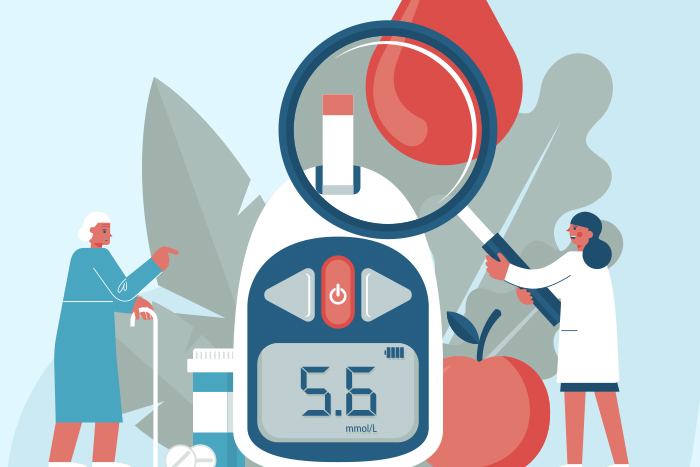Diabetes is a condition that affects millions of people, and as we age, it becomes more common. But don’t let it intimidate you! With the right care, knowledge, and support, you can take control of your health and continue living a full and active life.
Whether you’ve just been diagnosed or are looking for ways to better manage diabetes, this guide will help you understand what’s going on in your body and provide practical tips for managing the condition.
What is diabetes?
Diabetes happens when your body has trouble managing sugar (also called glucose) in your blood. Normally, a hormone called insulin helps your body use sugar from the food you eat for energy. When you have diabetes, either your body doesn’t make enough insulin, or it can’t use insulin properly. This leads to high blood sugar levels, which can cause health problems if not managed.
The good news? With the right steps, you can keep your blood sugar levels in a healthy range and prevent complications.
Top 10 Tips for Managing Diabetes
Here’s a list of 10 key tips to help you manage diabetes and feel your best:
1. Stay Active
Exercise helps your body use sugar more effectively. Aim for about 30 minutes of activity most days of the week. Gentle exercise, such as walking or dancing can be great ways to incorporate more movement into your daily routine. Active hobbies like gardening and playing with your pet also count! The key is to find something you enjoy so it feels less like a chore and more like fun.
If you're overweight, losing even a small amount of weight can make a big difference in your blood sugar levels. It can also help lower your risk of heart problems and other diabetes-related health issues. Some people may benefit from a weight loss program, which can provide extra support and guidance.*
2. Eat Smart
Choose foods that support steady blood sugar levels. Fill your plate with whole grains, lean proteins, healthy fats, and plenty of vegetables. Examples include:
Whole Grains: Examples include oatmeal, quinoa, brown rice, and whole-grain bread. These provide steady energy and help keep your blood sugar stable.
Lean Proteins: Try chicken, turkey, fish, eggs, tofu, or legumes like lentils and chickpeas. Protein helps you feel full and supports healthy blood sugar levels.
Healthy Fats: Include sources like avocados, nuts, seeds, and olive oil. These fats are good for your heart and can help slow the absorption of sugar.
Vegetables: Fill your plate with non-starchy veggies like broccoli, spinach, green beans, carrots, and peppers. They’re low in calories and packed with nutrients.
Fruits: Opt for whole fruits like berries, apples, or oranges, which have fiber to help manage blood sugar.
Avoid sugary snacks and drinks, and try to eat smaller portions to avoid blood sugar spikes.
3. Drink Plenty of Water
Staying hydrated is important for everyone, but especially for those with diabetes. Water helps your body process sugar more efficiently. Make it a habit to reach for water instead of soda or juice.
4. Keep an Eye on Your Blood Sugar
Monitoring your blood sugar levels regularly gives you a clear picture of how your body reacts to food, exercise, and medication. Follow your doctor’s instructions on when and how to check.
5. Take Medications as Prescribed
If your doctor prescribes medication or insulin, make sure to take it exactly as directed. This helps keep your blood sugar levels steady and prevents complications.
6. Snack Wisely
Healthy snacks can help keep your energy up and prevent blood sugar dips. Try options like nuts, cheese, or a small apple with peanut butter. Be mindful of portion sizes, as even healthy snacks can affect your blood sugar if you eat too much.
7. Prioritize Sleep
Getting enough sleep is essential for managing diabetes. Aim for 7-9 hours each night, and try to maintain a consistent bedtime routine. Poor sleep can make it harder to control your blood sugar levels.
8. Find Ways to Manage Stress
Stress can impact your blood sugar, so finding ways to relax is crucial. Here are some examples of how to reduce stress:
Deep Breathing Exercises: Spend a few minutes focusing on slow, deep breaths to calm your mind.
Yoga or Tai Chi: These gentle practices combine movement with relaxation and can help lower stress levels.
Hobbies: Engage in activities you enjoy, like knitting, painting, or reading.
Nature Walks: Spending time outside in a park or garden can be soothing and refreshing.
Social Connections: Talking with friends and family, or joining a support group can lift your spirits and ease worries.
Music or Meditation: Listening to calming music or trying a guided meditation app can help you unwind after a stressful day.
9. Stay Up to Date on Doctor Visits
Regular check-ups are important for keeping diabetes in check. Your doctor can help you track your progress, adjust your treatment plan, and screen for any potential complications.
10. Learn All You Can About Diabetes
The more you know, the better equipped you’ll be to manage your condition. Ask questions during your appointments, read reliable resources, and consider joining a support group for people with diabetes.
Living Your Best Life with Diabetes
Diabetes might be a part of your life, but it doesn’t have to define it. By staying informed, making healthy choices, and leaning on your healthcare team for support, you can take charge of your health and live the life you love.
Remember, you’re not alone on this journey. Millions of people manage diabetes successfully every day. With the tips above and a positive attitude, you can too.
Sources:
American Diabetes Association: Diabetes Overview
Mayo Clinic: Diabetes care: 10 ways to avoid complications
*Disclaimer: Healthcare Select may earn a commission if you purchase a product or service through links to our partners. This comes at no extra cost to you.

